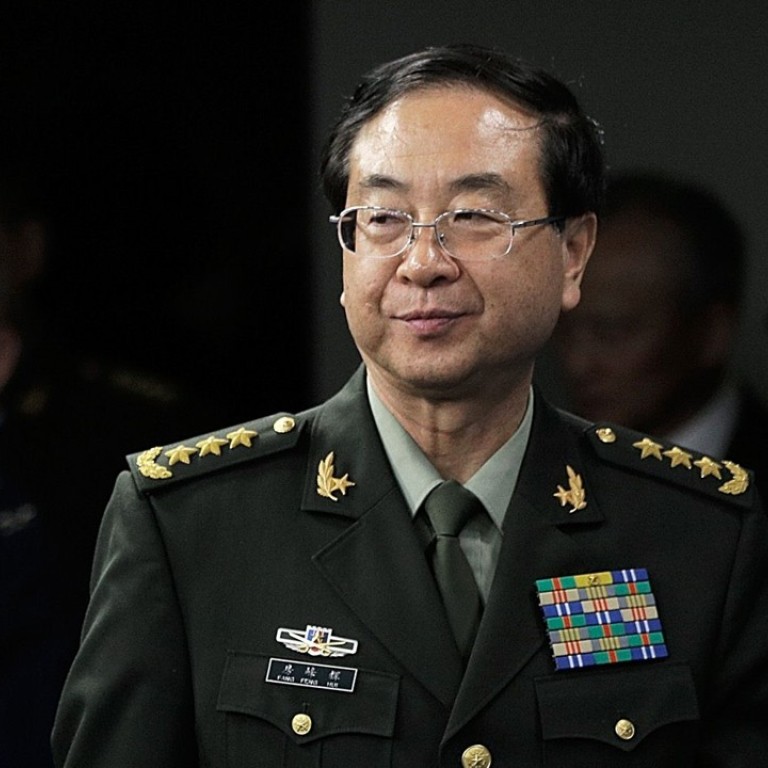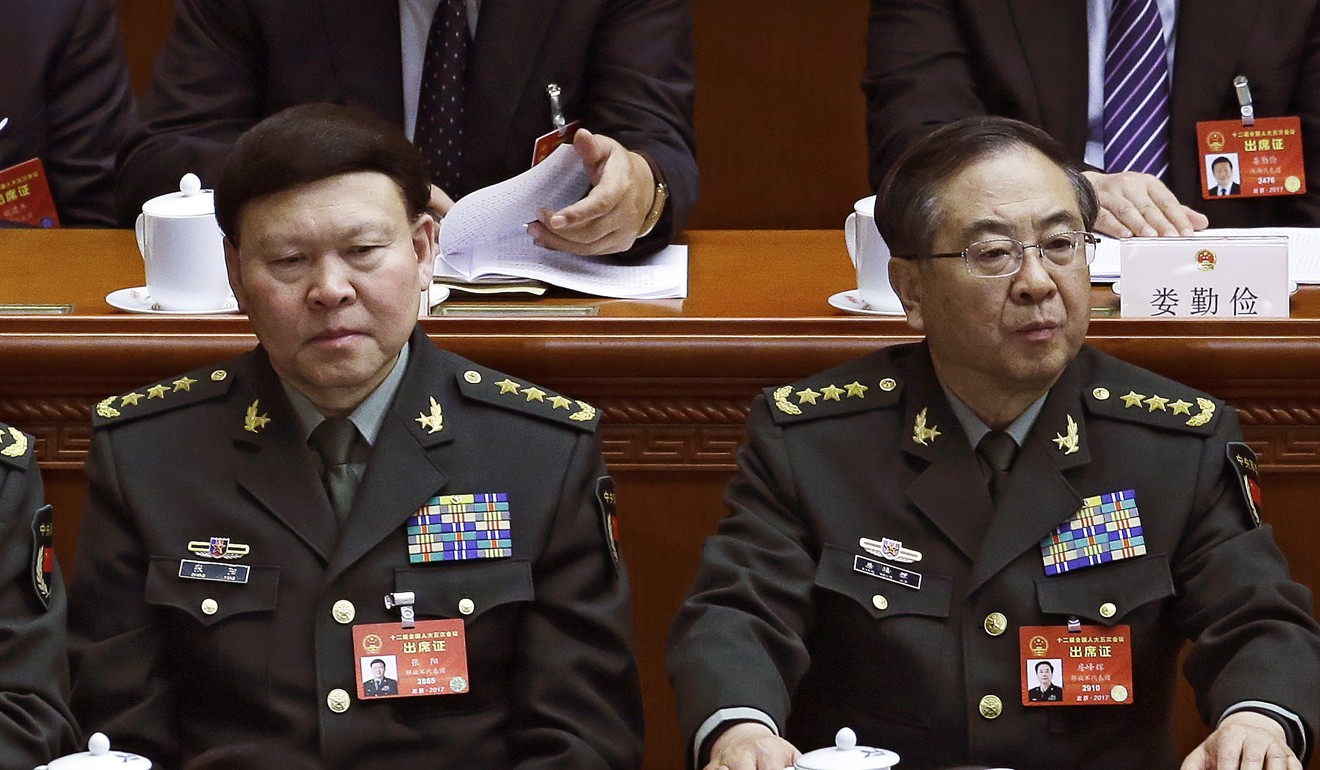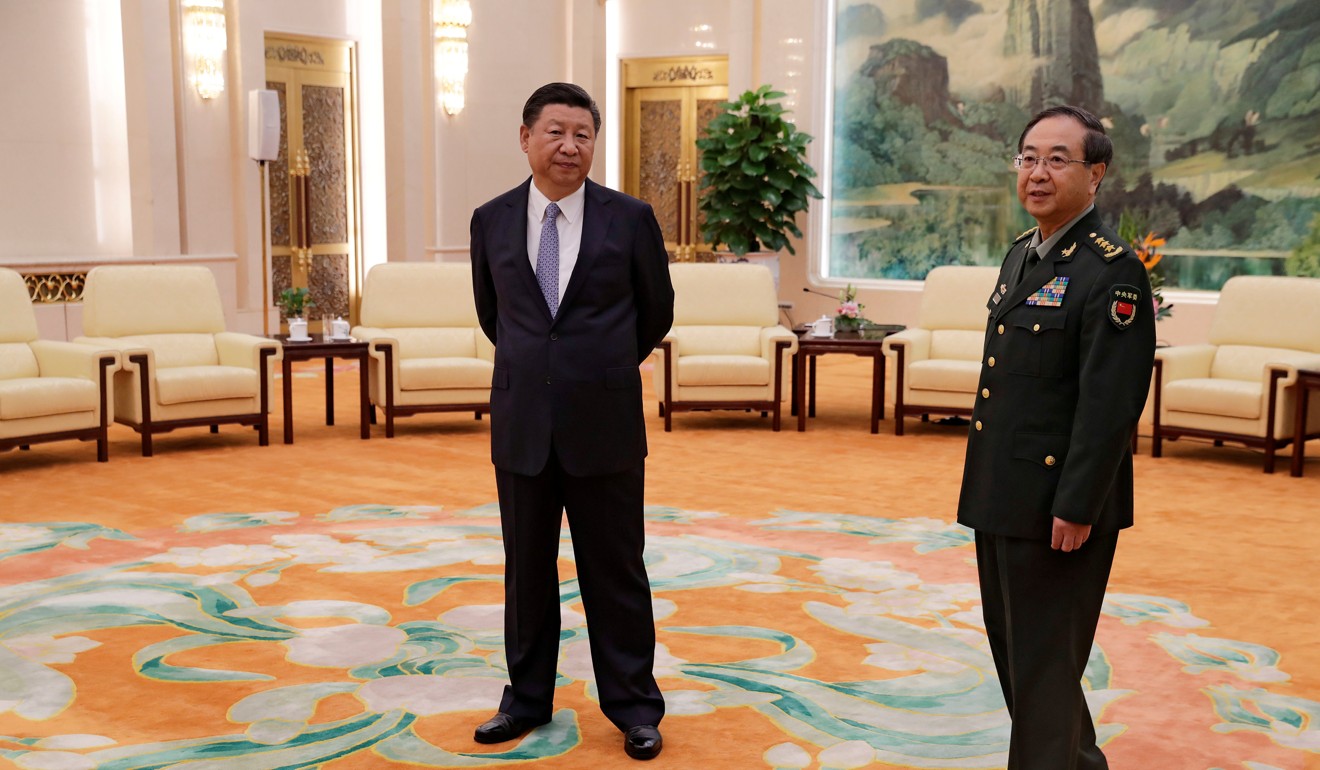
Chinese military to prosecute former top general for graft
Fang Fenghui, once the youngest commander of a People’s Liberation Army military region, suspected of taking and giving bribes
One of China’s former top generals in charge of the world’s biggest military will be prosecuted for bribery.
State-run news agency Xinhua reported on Tuesday that former chief of joint staff Fang Fenghui was suspected of taking and giving bribes and would be handed over to military prosecutors. It gave no further details.
Fang , 66, once the youngest commander of a People’s Liberation Army (PLA) military region, was described as an “opportunist” by military insiders.
He is a former member of China’s powerful Central Military Commission (CMC) and the latest “tiger” to be the target of a graft investigation following the suicide of Zhang Yang, who served alongside him on the commission.
“Fang has close links to Zhang’s superiors and subordinates because they were both protégés of disgraced former CMC vice-chairmen Guo Boxiong and Xu Caihou, with Fang being the most skilful opportunist, closely following Guo,” a source close to the military said.
“The investigation of Fang was announced so late because of the sudden suicide of Zhang. In order to decrease the impact of Zhang’s death to the army’s morale, Fang’s case was put aside a while until now.”

Zhang, a former head of the CMC’s political work department, hanged himself at his Beijing home on November 23, becoming the most senior military officer to commit suicide while under investigation in the anti-graft campaign launched by Communist Party general secretary Xi Jinping five years ago.
Another source said Zhang hanged himself just one hour before investigators came to his home to formally detain him.
Xinhua’s report in November confirmed Zhang had links to Guo and Xu, and was suspected of serious disciplinary violations – a euphemism for corruption.
Guo and Xu were the most senior military officers investigated for buying and selling military ranks and other forms of corruption in the sweeping anti-graft campaign. At least 13,000 military officers involved in corruption had been punished over the past five years, The PLA Daily reported in October.
Guo, 75, was jailed for life in July 2016 and Xu died of cancer at the age of 72 in 2015 while in custody and under investigation for graft.
Xinhua’s report about Zhang’s death said he had been summoned for questioning by the CMC’s disciplinary commission on August 28. At least three sources told the South China Morning Post that Fang was also taken away for questioning on the same day.

But the pair had been released after questioning and had been under house arrest, the sources added.
“Both Fang and Zhang were allowed to return home because they were all heavyweights in the military,” one source said. “But all their close attendants, including drivers and personal secretaries, were replaced.”
In late August, state media reported that Fang had been replaced as chief of joint staff by war hero General Li Zuocheng, while Admiral Miao Hua had taken over Zhang’s political work in the CMC.
In September, Fang and Zhang were omitted from the list of PLA delegates to the party congress published in state media – a hint they were in trouble.
Fang, like Guo a Shaanxi native, joined the army in 1968 when only 16.
Military insiders said Guo, who was commander of the Lanzhou Military Region in 1997 and a CMC vice-chairman from 2003 to 2013, had played a significant role in promoting Fang.
Fang was promoted to major general in 1998 when he was a corps commander of the Lanzhou Military Region. He became chief of staff of the Guangzhou Military Region in 2003 and was promoted to lieutenant general two years later.

In 2007 he was appointed commander of the Beijing Military Region, responsible for the defence of the capital. At the time, he was the PLA’s youngest ever regional commander.
As a rising star, Fang was in the limelight as he commanded the parade in 2009 to mark the 60th anniversary of the founding of the People’s Republic.
He was made a full general in 2010 and two years later he became chief of general staff and joined the CMC.
When former president Hu Jintao was CMC chairman from 2004 to 2012, Fang was seen as a loyal Hu protégé, but military insiders said they knew he was in Guo and Xu’s camp, which treated Hu as a mere figurehead.
“Both Guo and Xu were proxies of former president Jiang Zemin, with Fang, Zhang and other senior military officers their accomplices,” a Guangzhou-based military source said.
A Beijing-based source close to the PLA said Fang had been an ambitious and capable officer.
“Both Fang and Zhang were not so bad, but they couldn’t help but fall in line with the corrupt officialdom at the time,” he said. “Actually, they were brought down by an internal political struggle ahead of the five-yearly party congress [in October].”

